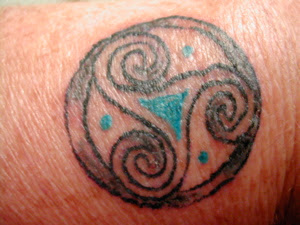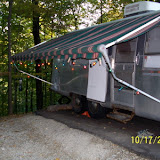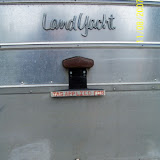
More about turning 50.
Some women have marked their passages into 50s with ceremonies of croning. Maybe without giving it very much thought (i.e., unconsciously), I had the idea in mind when I had the tattoo painted on my arm. Even as modern psychology recognizes stages of human development, so the ancient triple-goddess symbol of the triskele signifies a woman's development: child/child-bearer/crone. There would be much richness to draw upon from my own life and study.
I was born into a world populated by matriarchs, and I only knew my matriarchs, because the patriarchs died young, except for my father, currently residing in Alabama. My earliest memories are of, on my mother's side, my great-grandmother, whose husband was long out of the picture, my grandmother, whose husband died in battle in Germany in 1944, and my mother. On my father's side, I only knew my great-grandmother, whose husband died long before I was born. My father's mother died very early in my life, so I never knew her. Her husband abandoned the family when my father was 8 years old; he reappeared in death, by way of a life insurance check shared with my father by his estranged aunt, my grandfather's sister. So, if I drew a genogram, there would be symbols of death or estrangement attached to my male progenitors.
I am the first-born child in my immediate family of birth, and have two brothers (one is deceased), both, of course, younger than me in intervals of three and six years. With such a heritage, how could I not be a strong woman? Somehow, I became the adventurer, the risk-taker, and the tradition-smasher in my family.
There were other women in my family orchard who did not marry and/or bear children. By standards of small-town Southern mores, we were/are "eccentric." A student once jokingly called me eccentric one day, and I immediately recognized that he was right. I am not in the center of anyone's expectations, not even my own.
I recall having many late-night, wine-infused discussions with my mother about my not having children -- no, wait, start with not getting married -- and choosing to pursue a life of the mind. My heart would crack with guilt, I would cry myself to sleep, but I kept on choosing, making in the traveling a path that has become my life. Marrying into my family now, with an eight-year-old in the mix, does not really count, although I think there is something to be said for the exposure to the energy, the adjustment to, as a said previously, a much noisier and busier life.
Some say Chiclette will keep me young. Maybe that means I will not have the extent of eccentricity that comes with the kind of isolation and independence that some have after the child-bearing years have passed. No, Chiclette will not keep me young, but she will have an effect on the nature of my aging, that's for sure.
I think Chiclette's mom is the one who affects my aging the most. I'm sure I could fill another post with the benefits of exposure to her (Oh, yeah.).
The typical understanding of women in my orchard was that we who did not marry or bear children would stick around and care for the elders. So far, my elders have succumbed to disease, or, as with my Dad, remain healthy and independent. In the olde days, I would be expected to drop everything, build a room onto the family house, and take up nursing and housekeeping. This expectation is true in many communities here in the US, still, and everywhere. The extent of my compliance, so far, has been to reassure my father that if he should need me closer, I will always have room for him wherever I am living, and would not leave him to the kindness of strangers.
The embrace of the crone is, for me, a poetic venture. Do I see myself, as captured in my Wikipedia search on the term, crone, the hag, the scary old woman whose chief diet is small children (Hansel and Gretel), or the wise, beautiful elder woman, captured in this site? I would choose the latter, I think, although eventually, I think the former would be powerful, to carry eccentricity around the bend to a place understood by most people as somehow normal by the time a woman attains a certain age.
Croning is understood as a pagan ritual by most. So, what is pagan? Turning again to Wikipedia, I find that pagan, in its least value-laden meaning, obtains to the rural, the rustic, and the folkways of simple people. The negative meaning obtains to the uncivilized, religiously and socially backward, even hostile and anti-Christian.
Now, let's get real. My Christ-haunted life is really, honestly paganistic. I mean, I regularly take part in these kinds of rituals: worshipping a God who is actually three, celebrating feast days of beings who might be less than divine but who have, in death, gained elevated super-human status, and partaking regularly in a ritual of flesh-and-blood eating memorial to a ritual slaughter, complete with an epic mob scene probably more shocking than the public murders of Mussolini and Tito.
I do not kid myself. I live very close to paganism. What is there to prevent having a croning ceremony? I need to think this over. Maybe some will have suggestions?


